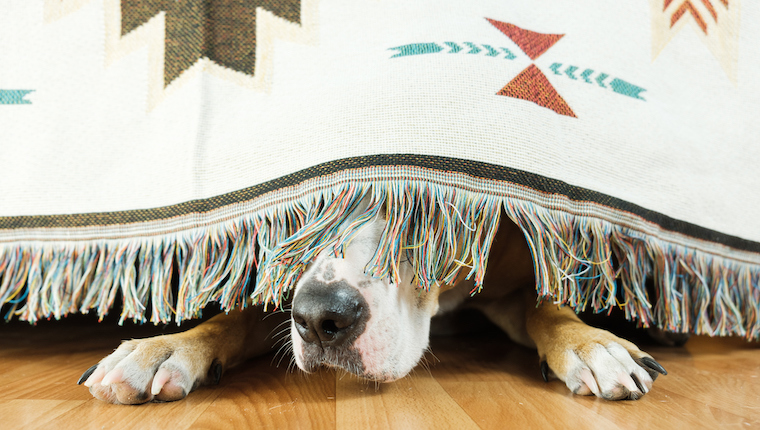Thunderstorm phobia is the intense reaction certain dogs have when a severe storm system is approaching. Some dogs may simply try to hide, but others can have more severe reactions. There have even been cases of dogs jumping through windows to escape the noise!
While noise anxiety is a common reaction to thunder and lightning in many dogs, thunderstorm phobia can have various causes, and the symptoms are more severe. Dog parents should be aware of how to manage their pet’s safety if they demonstrate this behavior.
What Causes Thunderstorm Phobia?
Unfortunately, thunderstorm phobia is an understudied phenomenon. Researchers believe it results from a variety of causes, including:
- Anxiety with loud noises and bright flashing lights, such as lightning, fireworks, gunshots, etc.
- Changes in atmospheric pressure and humidity affect your dog’s senses and cause discomfort.
- Arthritic dogs are sensitive to fluctuations in weather and can suffer more acutely when a storm is approaching.
Of course, the causes are as unique as the dog themselves. Some research suggests that certain dogs associate thunder with traumatic experiences from the past. Others have speculated that dogs may sense increased levels of static electricity preceding a storm. Finally, the genetic makeup of your dog can contribute to the likelihood of thunderstorm phobia.
What Are the Symptoms?
Anyone who has interacted with a dog suffering from thunderstorm phobia will recognize the symptoms right away. Some dogs will whine, bark, and pant. Others may cling to their dog parents or hide in closets and under beds. Dogs with severe thunderstorm phobia may urinate and defecate inside or chew on furniture compulsively.
Left untreated, thunderstorm phobia can manifest as full-blown panic attacks in dogs, affecting their health and safety. Signs of thunderstorm phobia can occur well before a storm arrives, so dog parents should be aware of any strange behaviors occurring before a storm.
How Can I Treat Thunderstorm Phobia
If your dog’s reactions are mild to moderate, there are certain tools you can use to help them feel safer. Dogs are highly attuned to their parent’s levels of stress and anxiety — maintaining your calm helps your friend feel safe. Consoling and speaking affectionately to your dog is helpful and can make a big difference in the long run. Don’t worry about encouraging any bad behaviors.
Creating a safe space in a dark room or closet can also help your dog feel they have a safe haven to stay in during a storm. A crate covered with a thick blanket can do the trick. Rewarding your dog with treats when they go into their safe space can help reinforce the behavior and help remind your dog that they are safe.
There are also special jackets and wraps, such as the Thundershirt, that calm your dog’s anxiety and can help them feel more secure.
More severe forms of thunderstorm phobia may require professional treatment. A variety of herbal remedies and pharmaceuticals exist to help ease your dog’s anxiety. Consult your primary veterinarian before giving medication to your dog.
Above all else, do not attempt to treat your dog’s phobias through exposure or conditioning. This can have the opposite effect and can cause your dog even more harm.









